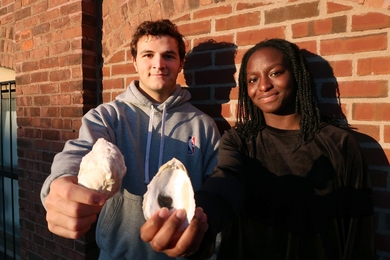Traditionally stereotyped as brainy geeks with coke-bottle glasses, inventors have seldom won teen popularity contests. But according to the latest information gathered by the Lemelson-MIT Program, inventors' status is rising among teens.
The Lemelson-MIT Invention Index -- an annual survey of Americans' perceptions about inventing and innovating -- found that teens do recognize the value of inventors when survival is at stake. Using the hypothetical example of being stranded on a desert island, the study found that nearly half (46 percent) of all teens surveyed would choose the company of an inventor over that of a famous musician (19 percent), athlete (6 percent), actor (13 percent) or president of the United States (9 percent). This indicates that inventors, although not revered as celebrities, hold a vital place in the minds of many American teens.
Teens ranked the same groups very differently when asked which they'd prefer to meet. In line with prevailing stereotypes, the most popular professionals that teens want to meet are musicians (30 percent), athletes (23 percent) and actors (22 percent). Inventors ranked lowest at 8 percent.
The findings are not good news for the future of American invention. Teens still don't aspire to become inventors; they would rather assume more traditional professions -- doctors, lawyers and teachers. The only careers ranking lower in the Lemelson-MIT study are politicians and journalists, revealing that much more needs to be done to foster interest in invention among American youth.
"In the knowledge-based economy of the 21st century, nothing is going to be more important than being able to invent the new and reinvent the old," said Professor Lester C. Thurow of economics, chairman of the Lemelson-MIT Awards Board. "In this environment, being an inventor has to be seen as a normal activity and not something reserved for geniuses. Bringing about this transformation in attitudes is what the Lemelson-MIT program is all about."
WHAT INSPIRES TEENS?
Although teens expressed only a lukewarm interest in inventing, the Invention Index highlights the reasons why teens would become inventors and provides a road map that can help educators better understand what inspires inventiveness in adolescents. Altruism is the primary motive behind why teens would invent -- to help mankind (43 percent) and to improve or preserve the quality of life (34 percent). Surprisingly, money (27 percent) and fame (17 percent) rank lowest of five choices. Having fun (32 percent) ranked a close third.
Most American teens surveyed said "finding a cure for cancer" is the most important issue for the new President to tackle, followed by "eliminating hunger." Colonizing space can wait.
This year's study also compared the attitudes of American adults and teens. Unlike teens, adults not only recognize the importance of inventors in society, but also view inventors as role models worthy of attention. Whereas the popularity of inventors among teens suffers in comparison to musicians and athletes, it remains highest among adults, who would choose to meet an inventor before all other types of professionals cited in the study.
Another question revealed that despite the proliferation of computers and society's reliance on information technology, the car is the one invention that Americans say they cannot live without. Although the gap between cars and computers has narrowed over the past five years, these findings mirror those of 1996, when the automobile topped personal computers by a whopping 63 percent over 8 percent. The lightbulb is second in both year's surveys.
ABOUT THE STUDY
The Lemelson-MIT Invention Index has explored American's perceptions about inventing and innovating since 1996. Previous topics were the importance of parents and teacher in fostering invention and innovation in today's youth (2000), the most profitable career areas for inventors (1999), areas of research and development supported by American taxpayers (1998), whether certain inventions make life easier or more complex (1997) and which inventions Americans could not live without (1996).
The 2001 Lemelson-MIT Invention Index Survey was conducted by Bruskin Research from a nationally representative sample of 1,010adults and 500 teenagers. The interviews were conducted from November 17-21.
A version of this article appeared in MIT Tech Talk on January 10, 2001.





